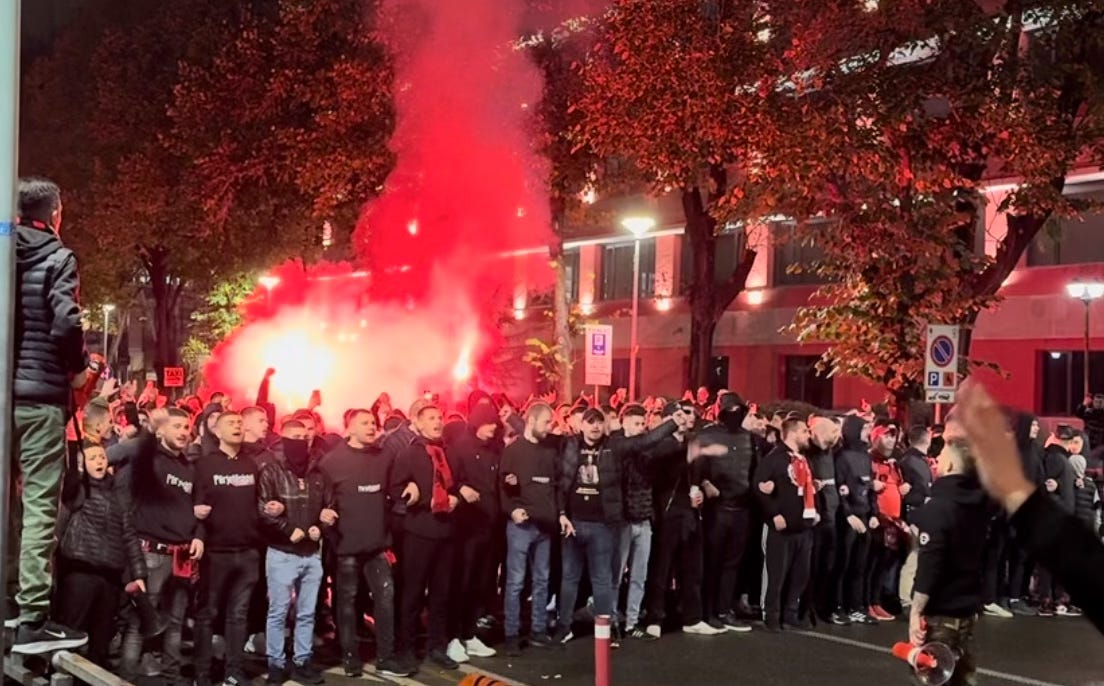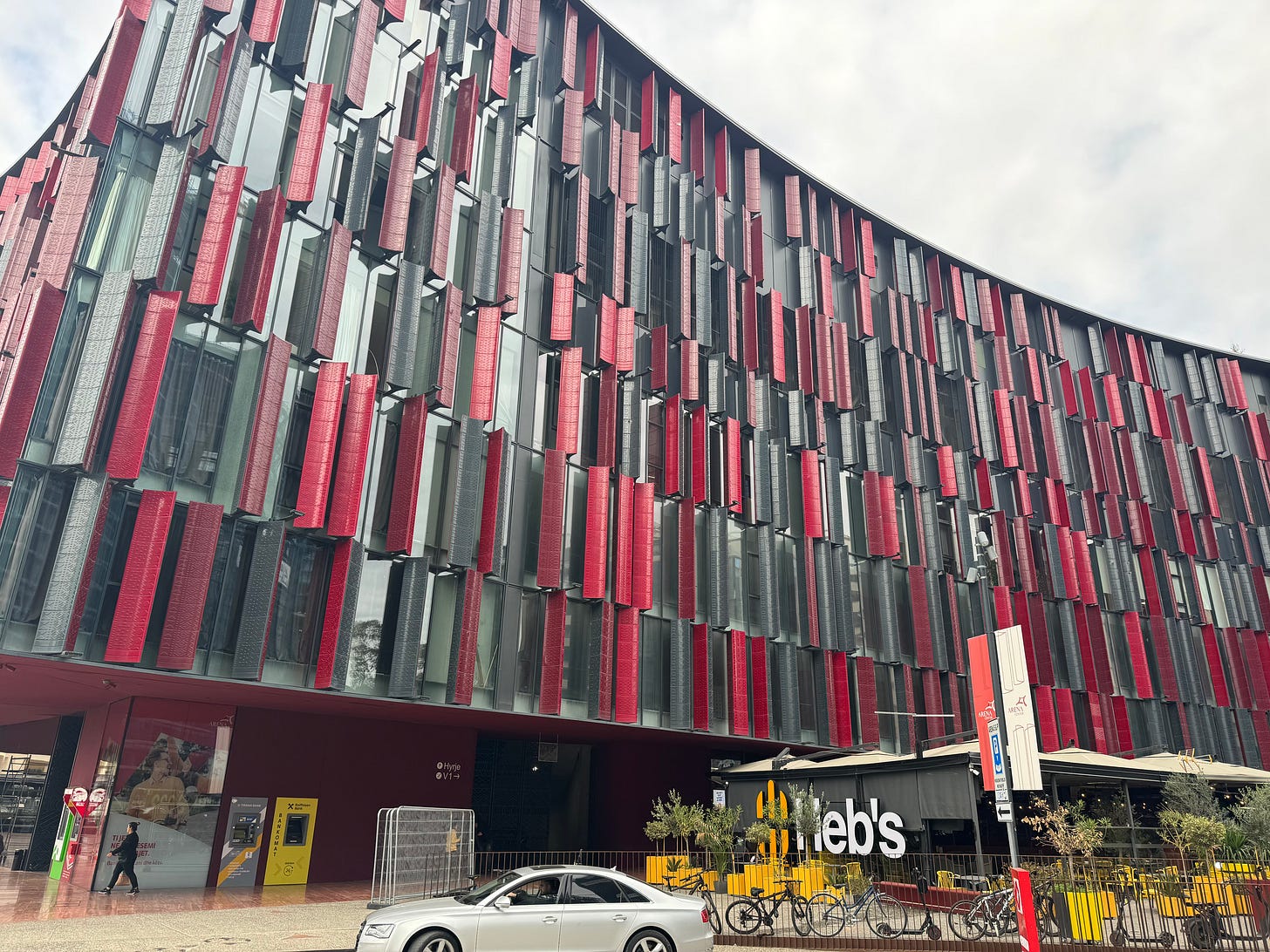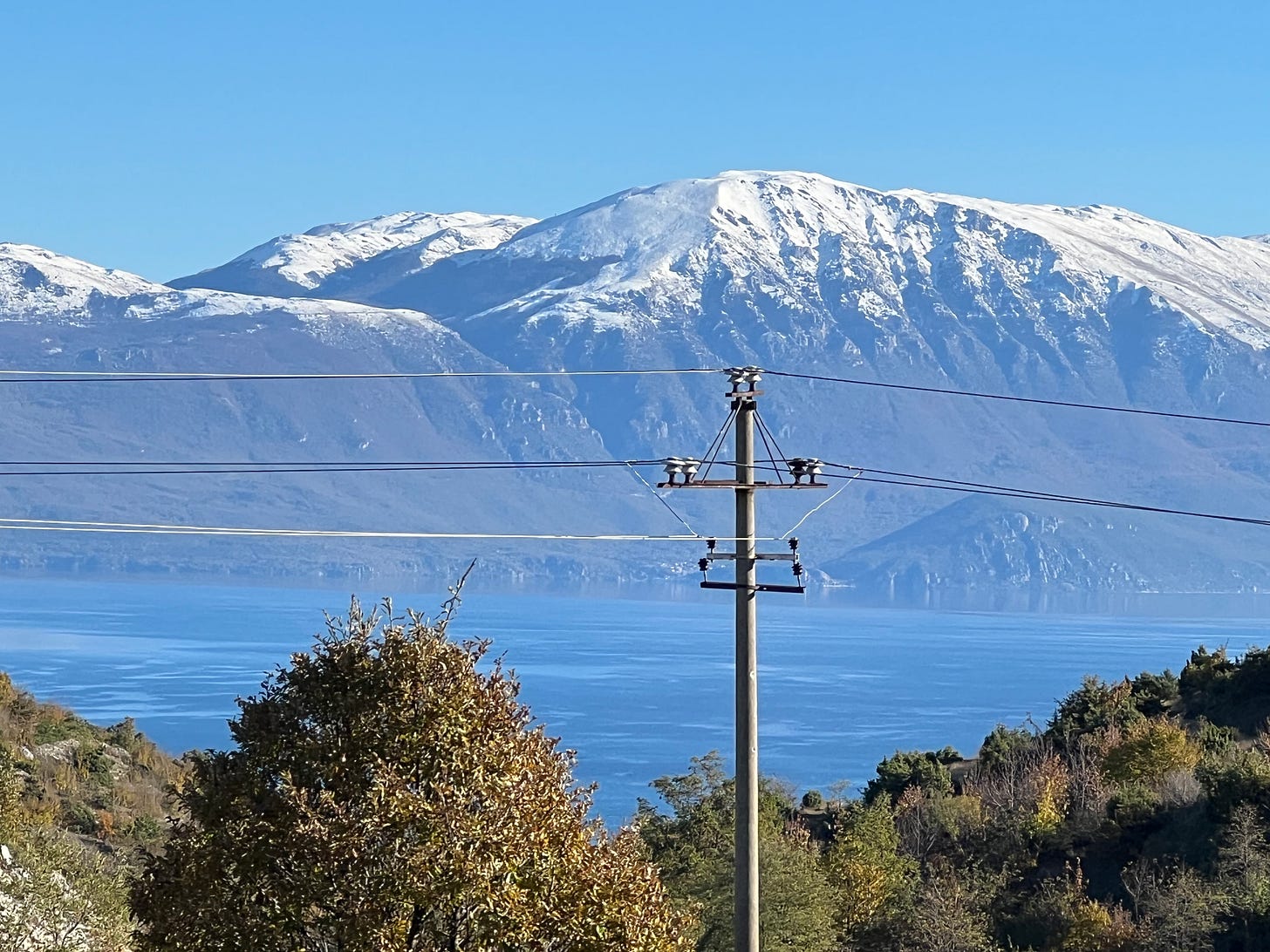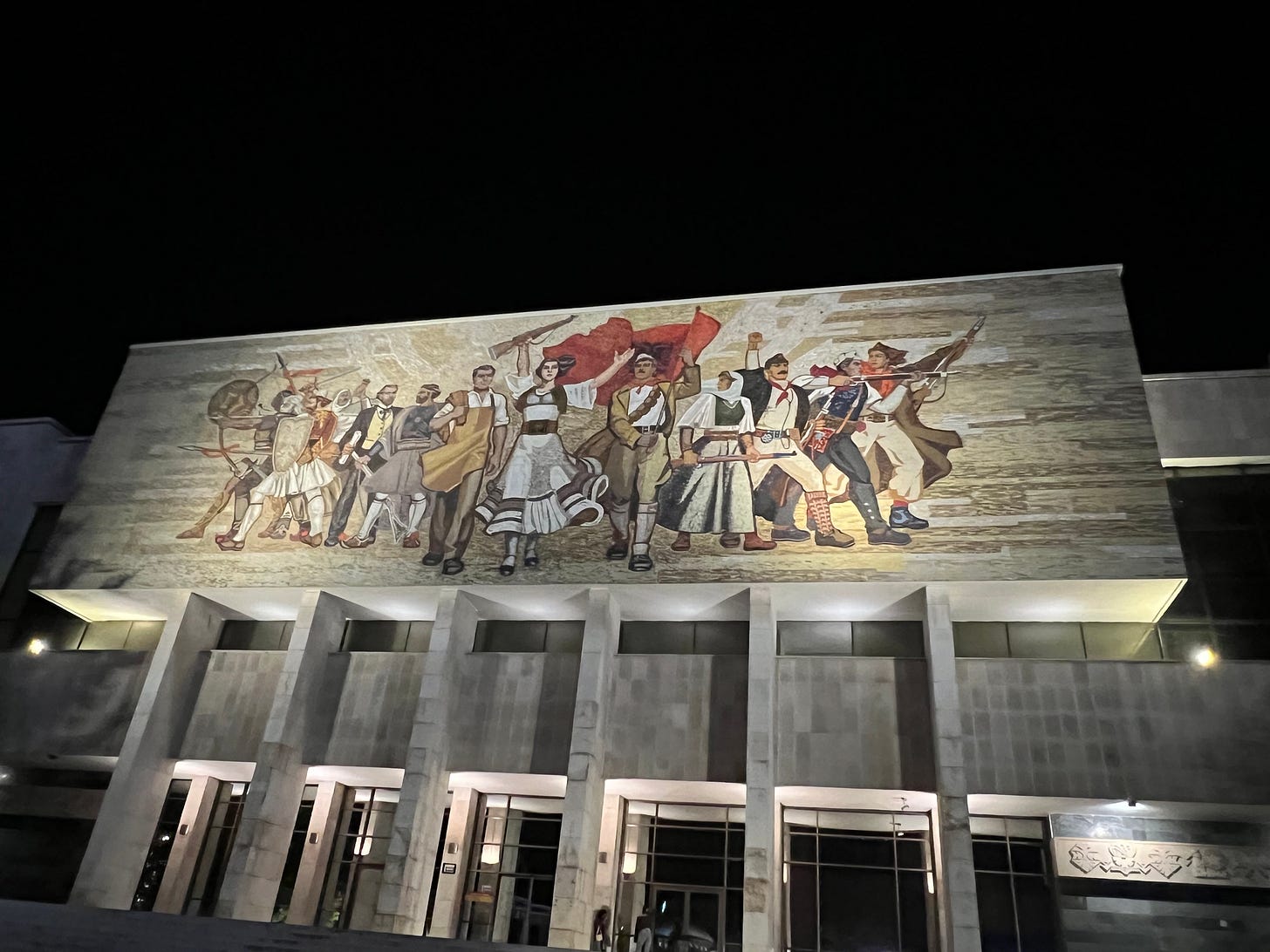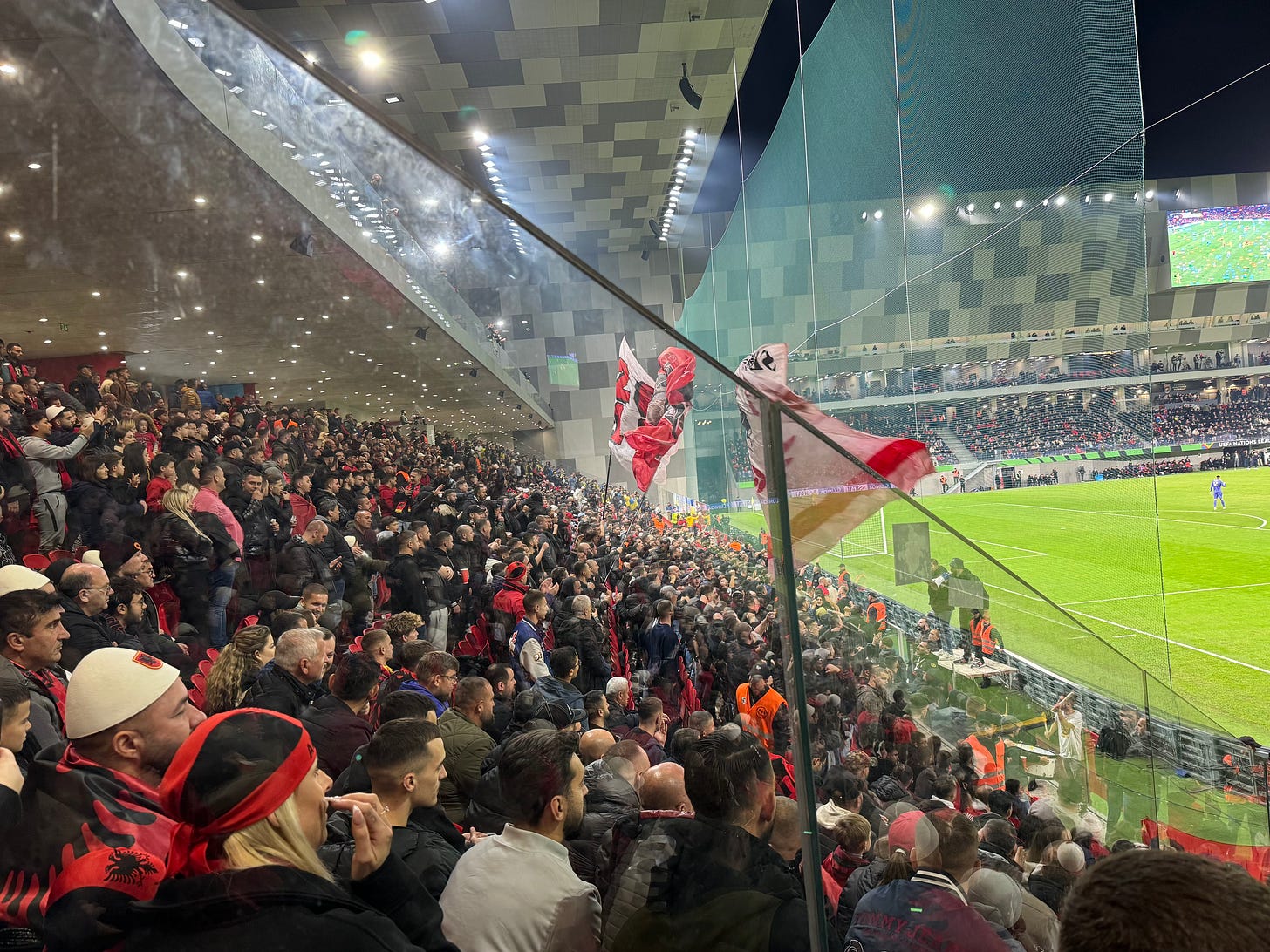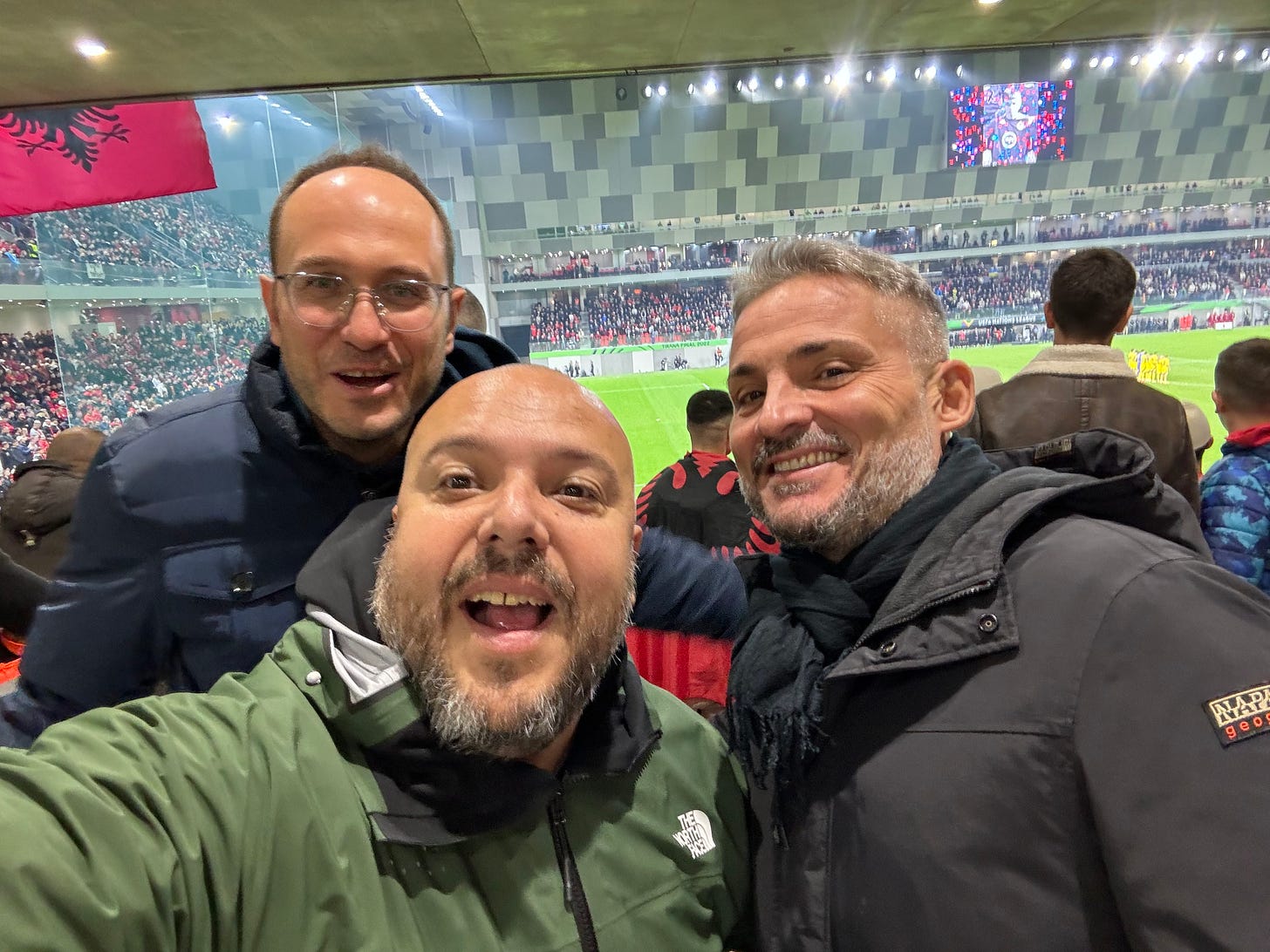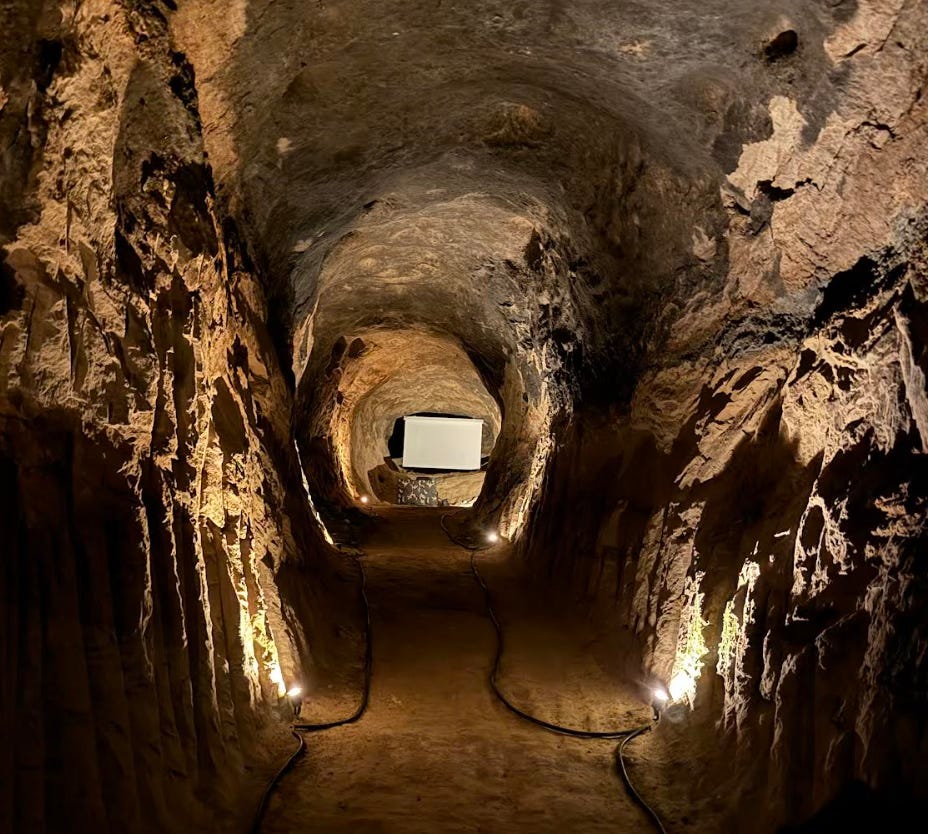Searching for Sylvinho
Ahead of England vs Albania at Wembley on Friday evening, here's my special feature
Searching for Sylvinho
By Layth Yousif in Tirana, Albania
The message came through an intermediary to my Albanian contact.
“You can talk to him,” I was told. Albeit laced with an exacting caveat. “But only if they win.”
The go-between added: “He’ll be in a good mood, and he’ll be happy to speak with you one-on-one to answer all your questions the day after the game,” before underling the catch once again.
“However,” the man informed me: “Albania have to beat Ukraine first. Then he’ll talk.
“But only if they win.”
Plenty of pyro on display during the pre-match corteo before Albania vs Ukraine in Tirana. CREDIT: @laythy29
……..
Tirana: Boomtown
You emerge from your ridiculously early-morning flight via your brightly coloured budget airline, into bright blue skies and study the vista.
Tirana Airport is fringed by a jagged mountain range, framing a spectacular view that stops you in your tracks on the airport tarmac.
Tirana is a boomtown. Fuelled by money earned by the country’s diaspora, you can tell the city is growing by the day by the number of cranes in action, allied with a raft of public works schemes currently digging up roads with newly-purchased heavy machinery as your taxi driver eases through new underpasses that weren’t here a mere 12 months previously.
I recognised the growth because I’d been trying to interview my target for a year now.
Arena Kombetare. Titana. CREDIT:
……
Everywhere you looked on the drive into central Tirana from the shiny new airport that puts hellscapes such as Luton to shame, new buildings were taking root. Hotels, apartments and businesses, alongside shiny new car dealerships that all point to the fact that this is a country on the rise.
The Albanian national team, known to everyone as Shqipëria, have also been on a compelling upward trajectory since the man I have travelled 1,500 miles to gain an interview with the man took over the team.
Since then, Sylvio Mendes Campos Júnior – or Sylvinho - has revitalised the team, earning a joyous qualification to Euro 2024, where they were desperately unlucky not to qualify for the knockout stages in Germany. Where I covered their valiant 1-0 defeat to the eventual winners Spain, during a raucous atmosphere generated by their legions of passionate and peaceable fans on a sweltering June day in Dusseldorf.
Since then, the 50-year-old Brazilian with salt and pepper hair and a chiselled jawline that makes him look ten years younger, has steered them to the brink of promotion in the Nations League format.
In a tough group, that saw Albania beat fellow Euro 2024 qualifiers Georgia 1-0 in a tough assignment in Tbilisi, before doubling down with another victory on the road, this time a 2-1 win over Ukraine, in a match played in Prague thanks to the geo-political instability caused by a sub-Bond villain in the Kremlin.
All of which led us to Albania hosting Ukraine in the return fixture at the city’s state of the art, 22,500 capacity Arena Kombëtare. Built in 2016 on the site of the country’s former national stadium Stadiumi Qemal Stafa, named after a World War Two hero.
Quite simply a win for Albania would see them promoted from the relentlessly internecine League B, Group 1 into the rarified air of the top table of Nations League action.
With a victory also ensuring my longed-for interview.
.........
Searching for Sylvinho: Part One
I tried on my first visit to Tirana back in November 2023. I forwarded my credentials, informed fixers of my Premier League accreditation, even sending a picture of me with Arsenal boss Mikel Arteta, in a bid to underline I wasn’t about to turn into a deranged superfan upon meeting the former Gunner, but to no avail.
In fairness time was of the essence as I was on a five-day road trip, using Tirana as my base, while my Albanian contact drove me across the stunning Skanderbeg mountain range, lassoing the world heritage Lake Ohrid (below) before crossing the border into North Macedonia, where I covered England’s final Euro 2024 qualifier in Skopje.
The stunning Lake Ohrid on the border of Albania and North Macedonia. CREDIT:
We could have returned through the mountains a day earlier on the way back, but, along with some friends who’d travelling to support the Three Lions, we opted for a memorable 24 hours in Kosovo, taking in their match with Belarus, in the capital Pristina, where the local news had recently shared the story of hundreds of children being given the moniker ‘BillClinton’ and ‘ToniBlair’ as first names, after their late 20the century politicians halted Serbian bombs in the Albanian dominated Balkan enclave that was to became a country.
Meaning, by the time we’d finally returned to Tirana, Sylvinho had already departed back to the sunnier climes of his homeland in Brazil, and with it, any chance of an interview had disappeared.
……..
Searching for Sylvinho: Part Two
Fast forward 12 months, and I was back in Tirana. My taxi driver had reached the centre of this intriguing city, complete with a nuclear bunker under a roundabout in the centre of town.
Mobile phone shops and pet shops bustled for attention opposite strip clubs, while markets abounded, offering colourful produce studiously handled by prospective buyers. The eye caught by long bright red peppers, gnarled and pointy as a witch’s finger marshalled for attention alongside pale unidentifiable fruit, near to a roundabout, peopled by a man in a top hat that turned out to be none other a certain Thomas Woodrow Wilson.
The 28th President of the US, interceded on behalf of Albanian independence between 1919 to 1920, strongly arguing against a proposed partition of Albania by the Paris Peace Conference, subsequently enabling Albania to achieve statehood and international recognition via the League of Nations. No wonder to this day, many Albanian parents name their offspring ‘Vilson’, the Albanian version of Wilson, in honour of the former president.
Soviet Era art in central Tirana. CREDIT:
After the Second World War, Albania became a one-party communist state, the People's Socialist Republic of Albania, dominated by the dictator Enver Hoxha, who ruled for nearly 40 years until his death in 1985.
Under the mercurial Hoxha, Albania became a staunchly isolationist state, refusing to align with either the Soviet Union or the United States. Hoxha was so paranoid, so isolationist and quixotic, he’d managed to fall out with Russia, China and North Korea, leaving Albania alone and hesitant.
Hoxha even banned religion, overseas travel and outlawed private property, making Albania one of the most repressive countries in Europe. In 1967, Hoxha declared Albania the world's first atheist state, violently suppressing religious activity.
Fuelled by his paranoia after falling out with Russia, and then China, leaving the isolated stage friendless on the international stage, Hoxha built thousands of bunkers, convinced that an attack - by who, it wasn’t confirmed - was imminent. These concrete shells, big and small, punctuate the country, as well as cities, including the capital Tirana.
It was no surprise then, that Albania emerged from the death of its long-serving autocrat Communist iconoclast leader, Hoxha, blinking and unsure, rocked by the double whammy of the fall of the Soviet Union soon after.
Enver Hoxha's hotline to the Kremlin situated underneath central Tirana in the dictator's former nuclear bunker. CREDIT:
Layth (@laythy29)
After Hoxha’s 44-year rule ended in 1985, his legacy was 221,143 bunkers, a number which beggared belief, solemn and stark reminders of previously dark days, until recently, where many have been transformed into creative enterprises, not least a startling, must-visit restaurant, which my Albanian friend takes me to the day after the football.
To underline the changes over the last three decades, I walk past Tirana’s Pyramid. Built as a monument to Hoxha following his death in 1985, the bizarre white angular building fell into a state of disrepair — only to re-emerge as a hub for tech and creative industries.
The building is near to the sprawling Skanderbeg Square, named for a national hero who led a revolt against the Ottoman empire in the 15th century.
I visit Hoxha’s top secret nuclear bunker slap bang in the city centre, now called Bunk’Art. The claustrophobic underground network of tunnels off Skanderbeg Square was once connected to Albania’s Ministry of Internal Affairs and, in a way, showcase just how far the country has come.
I ask my friend if his family knew about the bunkers in the 1980s. No, he replied emphatically. No-one knew anything. No-one said anything.
In Tirana, remnants of the communist era, including statues of Lenin, Stalin, and Hoxha, are located behind the National Art Gallery, sporting a vast Soviet era mosaic on its outside wall that makes me halt in my tracks to take it all in.
Nearby, the intricate 18th-century Et-hem Bey Mosque stands, as I visit a bustling bookshop to buy a couple of works from Albania’s foremost writer, Ismail Kadare.
You can always gauge the health of a country by visiting its bookshops, and the one I went to near the university was absolutely bustling with young people, motivated by a desire to learn. It was wonderful to see.
……
Albania vs Ukraine.
The scene was set. It was all or nothing.
I didn’t want to turn up at a post-match press conference desperately firing a quick-fire obsequious question at a non-plussed Sylvinho, prior to lobbing a supplementary inquiry relating to his time in England in the Premier League, most specifically with refence to his time at Arsenal.
No, I wanted an exclusive sit down, to build a rapport, in a bid for the Brazil star to regale me with his memories, while also seeking his views on Brazil stars in the Arsenal side, past and present, players and administrators.
And the only way to get that bounty after months of negotiation boiled down to the simple fact of requiring Albania to beat Ukraine.
Albania vs Ukraine at Arena Kombëtare. CREDIT:
……..
All or Nothing
The headline in Albania’s national sports newspaper the morning after the night before was telling.
The Panorama Sport daily paper thundered: “Albania is asleep, Ukraine gives us a cold shower,” after the home side were unexpectedly beaten 2-1 in Tirana by Serhiy Rebrov’s Ukraine.
My Albanian friend Henri sources tickets. We became firm friends during a riotous year studying for our Masters a long time ago, and have kept in touch ever since. Henri is engaging company, good-natured, loyal and strong as an ox. He can also speak eight languages and is hugely resourceful. We meet his passionate, Napoli-supporting Italian friend Massimo, who is also great company.
Yours truly with Henri and Massimo at Albania vs Ukraine
Prior to kick-off the scene had been set for Albania to be promoted to the top table of international football on the continent — or at the very least a valid expectation from its passionate fans at the exciting prospect of reaching the European Nations League play-offs, in a bid to reach the top level next spring.
As darkness fell in the intriguing Albanian capital before kick-off, excitement was high. There was plenty of red pyro on show in the pre-match 'corteo', as Albanians, and ethnic Albanian's who had travelled from Kosovo for the game, walked to the ground in noisy but good-natured display.
Hope was also high following a series of excellent results by Albania’s battling underdogs.
However, in the space of 10 minutes, those dreams had been shattered to give an impregnable base that allowed Ukraine beat Albania, thereby avoiding relegation from Nations League — and instead giving the yellow and blue visitors a chance of promotion, previously hoped-for by Shqiperia, the Eagles.
Zinchenko shines against Shqiperia
Arsenal’s experienced Oleksandr Zinchenko stunned the raucous home crowd in the near-capacity 20,547 attendance at the Arena Kombetare by scoring after only five minutes.
Worse was to come a mere five minutes later for Brazilian Sylvinho’s side, when Roman Yaremchuk scored to make it 2-0.
Yaremchuk, an experienced 28-year-old Lviv born attacker, who has had previous stints at Benfica, Bruges and Valencia, while now playing his trade with Olympiacos in Greece, headed past Albania’s former Brentford keeper Thomas Strakosha. Who in a further blow, now plays for Yaremchuk's Athens rivals AEK to double Ukraine’s lead — effectively killing the clash as a contest — even if Albania’s passionate fans kept up their relentlessly impressive support throughout the whole 90 minutes.
As the clock ticked down, hopes flickered briefly when Albania’s Rangers’ Swiss-born attacker Nedim Bajrami successfully slotted home his spot-kick with 15 minutes remaining. But try as they might Albania couldn’t reach parity, let alone grab the unlikely victory required.
For Zinchenko the victory was hugely satisfying, given that the former Manchester City defender has been used sparingly by Arsenal boss Mikel Arteta.
The Gunners left-back was influential when featuring in central midfield for his country, who prior to kick-off were bottom of Group B1, and staring at possible relegation to League C.
Yet, amid the pressure, Zinchenko’s early opener handed Ukraine a dream start, when a shot deflected into his path, before the seasoned 27-year-old volleyed the ball low into the bottom corner for his 10th international goal during his 70th cap for his war-torn country. Thereby sending his team on their way to a memorable victory in the Albanian capital.
Honest reflection from Shqiperia’s distraught players followed fast.
Ardian Ismajli, captain of the national team assessed the situation, correctly, and with a searingly forthright honesty by saying: “The first half was the worst we have played in the last three years,” adding: “It's really painful because we could have reached the playoffs.
“We need to learn from this defeat; we gave Ukraine too many chances in the first half.”
Referring to his side’s previous victory over the Czech Republic in the same group he explained: “It was the same against the Czechs — we started poorly, but back then we were lucky. This time, luck was not on our side, and we conceded two goals.
“In the second half, we were more focused. We had nothing to lose. The second half was very good, but it was not to be.”
Leader Ismajli, who plays as a centre-back for Serie A club Empoli, was born in nearby Kosovo, which has a majority Albanian population, with a number who had travelled to Tirana on Tuesday evening to support Albania.
Not least with their lively pre-match corteo — a procession of passionate fans who gathered to march together to the stadium while singing booming songs and lighting colourful red pyro. Fittingly the engrossing spectacle took place near to Free Ukraine Street in the centre of beguiling Tirana.
Inter Milan midfielder Kristjan Asllani doubled down on the honesty, laced with bitter disappointment.
The San Siro midfielder said: “We started the game very poorly; at home, you can’t concede two goals in the first 10 minutes,” he admitted after the loss.
“These things happen in football, but the match shouldn’t have gone this way. In the first half, we struggled a lot without the ball.
“I think it was our worst performance because we had many issues. In the second half, we changed formation, and the game shifted.
“Today, we wanted to take points, if not a win, at least a draw. But football is like this, and we’ll improve.
“At half time, the coach didn’t say much; it was more about the opponent changing their approach.
“In the first half, we had so many problems — they were always free, and we were chasing shadows.
“In the second half, we mostly went one-on-one, and they became hesitant.
“I’m really disappointed because we could’ve at least earned a point.”
Those heartfelt feelings, coupled with Georgia’s loss to the Czechs, saw Ukraine jump two places to second in the group, and secure a promotion play-off against Serbia, Scotland, Hungary or Belgium, cruelly crushing Albania’s hopes of reaching League A in 2025.
With boss Sylvinho’s future now uncertain after such a damaging defeat, no wonder Tirana’s Panorama Sport newspaper concluded: “Tired Albania, Ukraine made us feel cold.”
…..
I hear from the contact.
I am told: “The Brazilian is not in the mood for talking.”
……..
To lift our spirits, my Albanian friend decides to take us to a restaurant, Kazerma e Cerenit, a former nuclear bunker and military barracks, now transformed into one of the country’s must-visit destinations.
The startling business is the brainchild of the charismatic Ismet Shehu, an Albanian chef who trained in London, and who once served lunch to Queen Elizabeth II, but has now returned home to establish a raft of acclaimed restaurants. (More on this in a future post.)
The food is superb, the setting quirky, bizarre and memorable. We eat and drink, toasting Albania and friendship, and our absent friend, Sylvinho. The engaging Islet even agrees to a memorable interview.
Enver Hoxha's former nuclear bunker now part of Ismet Shehu's superb restaurant, Kazerma e Cerenit. CREDIT: laythy29
….
Back home, I fire a question on Zinchenko’s performance against Albania, and the Ukrainian’s role in the Arsenal squad, during Gunners boss Mikel Arteta’s first pre-match press conference at the club’s training HQ London Colney, after the round of internationals.
On Oleksandr Zinchenko’s role in the squad, Arteta tells me: “Those decisions are always difficult to make. You make them with the only intention to get the result with the performance that you want, but Alex has already proven for many years something that he has to do and that he has the ability to do it.”
……
Postscript:
That really should have been that.
Given the vagaries of football, and international football, Albania’s galling defeat to Ukraine last November should have ensured the end of the Sylvino era.
However, shortly afterwards, Shqiperia were drawn in England’s World Cup qualifying group.
As I discovered, Albanians are a loyal breed, and fuelled with the desire to face the country where he memorably plied his trade with Arsenal all those years ago, the Brazilian opted to stay as boss of the country’s national side.
Meaning further opportunities in a bid to interview the great man…
………
I am covering England vs Albania at Wembley tonight, as well as the return fixture in Tirana late this year. I hope to finally get that exclusive interview in Albania.
Add your email to receive Layth’s Take, my regular Substack post on life, sport, music, travel and dogs. Or why not consider leaving a small donation so that I can continue to write long-form articles such as this…

